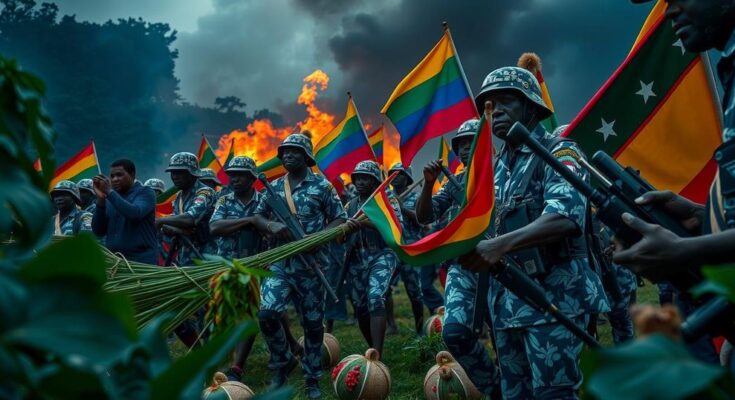The DRC, one of the poorest countries despite its wealth in resources, is facing a constitutional crisis under President Felix Tshisekedi, who is accused of attempting to manipulate term limits after controversial elections. His proposition to amend the constitution is perceived as self-serving, drawing parallels to former president Joseph Kabila’s failed power extension. The populace fears a return to instability, compounded by international interests leveraging the country’s mineral wealth.
The Democratic Republic of Congo (DRC) is grappling with significant challenges, marked by widespread poverty, persistent insecurity, and a dire humanitarian crisis. President Felix Tshisekedi, who assumed office amidst controversy in 2018, has seen little advancement in addressing the pressing needs of his constituents. Following the contentious elections of 2023, he has proposed a constitutional overhaul, claiming the existing constitution is antiquated. This initiative raises concerns among many Congolese who suspect it aims to modify or reset presidential term limits, reminiscent of the actions of his predecessor, Joseph Kabila. Kabila’s controversial attempt to extend his presidency ultimately culminated in widespread discontent, which facilitated Tshisekedi’s rise to power. Despite this historical context, President Tshisekedi appears detached from the ramifications of altering constitutional provisions in pursuit of personal political gain. The threat of instability looms large as external actors vie for access to the DRC’s wealth, potentially exacerbating the country’s systemic issues rather than alleviating them. The ongoing political maneuvers raise alarms as they threaten the fragile democratic framework of the nation. International interests may overlook Tshisekedi’s controversial strategies for short-term economic gains, complicating the DRC’s path toward enduring stability and prosperity for its citizens. The populace remains acutely aware of the historical risks associated with political power grabs, leading to justified apprehensions regarding future governance, democracy, and the rule of law.
The DRC experiences profound socio-economic challenges compounded by political instability and insecurity. As one of the world’s richest countries in natural resources, the DRC paradoxically ranks among the poorest globally. The eastern regions of the country are particularly affected, plagued by armed conflicts and widespread displacement of civilians. In recent times, political developments have further complicated the landscape, with President Tshisekedi’s governance poorly addressing the pressing needs of the Congolese people. Notably, his current push for constitutional reform is viewed with skepticism, igniting fears of a potential constitutional coup as he attempts to solidify power for himself.
In summary, the DRC faces a precarious juncture where the quest for constitutional reform can be perceived as an attempt to circumvent democratic norms and extend presidential power. The echoes of past leadership failures underscore the critical need for vigilance among the Congolese populace and the international community. As Tshisekedi prioritizes a change in the constitution, the implications for democracy and stability in the region must be closely monitored to prevent further deterioration of governance and civil rights.
Original Source: www.cfr.org




